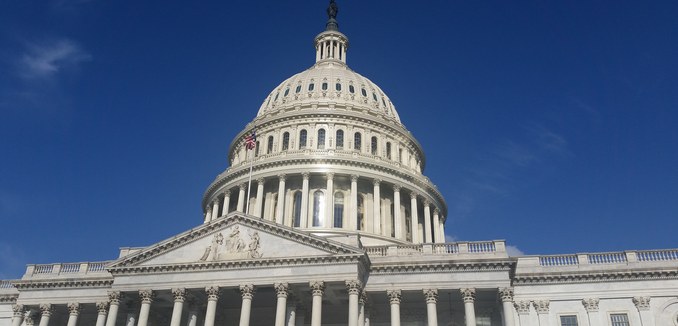The anti-Israel boycott bill currently being considered by Congress would prohibit individuals and organizations to “boycott Israel at the behest of international governmental organizations,” and would not affect a person’s ability to criticize Israel, wrote two former Democratic administration officials in an op-ed published Tuesday in The Washington Post.
Jonathan Greenblatt, a former assistant to President Barack Obama and currently CEO of the Anti-Defamation League, and Stuart Eisenstat, a former domestic policy adviser to President Jimmy Carter, asserted that the Israel Anti-Boycott Act is a necessary upgrade to legislation passed in 1977 targeting the Arab League boycott of Israel. As a member of the Carter administration, Eisenstat helped draft the earlier legislation.
The new bill, they wrote, would target boycotts of Israel initiated by organizations “such as the United Nations or even the European Union, that might parallel the Arab League’s original ‘blacklist’ of companies doing business with Israel, which was the heart of its boycott.”
Updating the legislation is especially necessary now as the United Nations Human Rights Council just passed a resolution to create a database of companies doing business or have relationships with those in the West Bank, with the aim of establishing a boycott that targets Israel. The UN’s high commissioner for human rights “appears determined” to implement the resolution, which would “create a new ‘blacklist’ that could subject American individuals and companies to discrimination, yet again, for simply doing business with Israel.”
Greenblatt and Eisenstat added that the EU has implemented a labeling requirement for goods produced in the West Bank and restricts academic cooperation to only those institutions that are to the east of the Green Line.
“None of the many U.N. member states that are serial human rights violators are accorded similar treatment,” they noted observing the hypocrisy in targeting Israel. “Not Iran. Not Syria. Not North Korea.”
The effect of targeting Israel alone, Greenblatt and Eisenstat wrote, will not “create the right atmosphere to prompt resumption of peace talks between Israel and the Palestinians.”
Greenblatt and Eisenstat also denounced the ACLU’s criticism of the bill as an attack on free speech. The ACLU and other critics of the Israel Anti-Boycott Act have not “cited a single instance in which ‘political beliefs’ have led to civil or criminal penalties under current law,” Greenblatt and Eisenstat wrote. They also noted that courts have consistently upheld the 1977 law “as a legitimate restriction on commercial conduct.”
The current legislation, they argued, doesn’t prevent an individual from criticizing Israel, rather it boycotts Israel “at the behest of international governmental organizations, just as they are now prohibited from doing at the behest of Arab nations.”
Steven Sheffey, a Democratic party activist, argued last month in the Huffington Post that the Israel Anti-Boycott Act “should hardly be controversial.”
“A two-state solution will require both Jews and Palestinians to relinquish their claims to land that they believe is rightfully theirs …” Sheffey wrote, making a point similar to one made by Greenblatt and Eisenstat. “Putting pressure only on Israel, as if Israel can unilaterally solve this problem, will only stiffen Israeli resistance and encourage Palestinian intransigence.”
Sen. Ben Cardin (D – Md.) and Sen. Rob Portman (R – Ohio) wrote in response to the ACLU:
Individuals who “actively avoid purchasing goods and services” because of their own political viewpoint would not be subject to the bill. Similarly, the bill does not regulate civil society organizations who are critical of Israeli policies or prevent them from speaking in favor of BDS. The legislation does not encourage or compel persons to do business with Israel, nor does it punish individuals or companies from refusing to do business with Israel based on their own political beliefs, for “purely pragmatic reasons,” or for no reason stated at all. Any suggestion that this bill creates potential criminal or civil liability for these actions is false.
In a similar defense of the Israel Anti-Boycott Act, Northwestern University Law Professor Eugene Kontorovich said in an August presentation on Capitol Hill that the legislation only targets material support for an unsanctioned boycott campaign organized by foreign governments and organizations.
[Photo: soccerdhg / Flickr]




